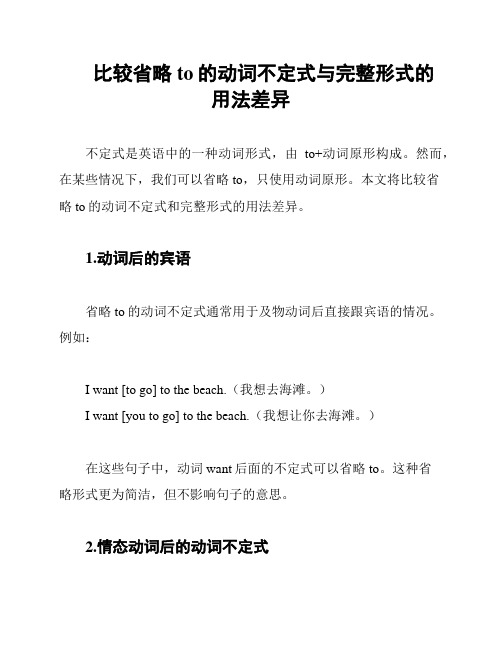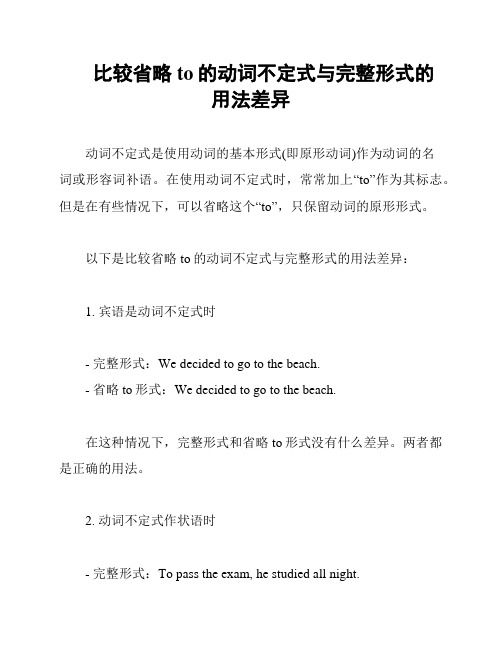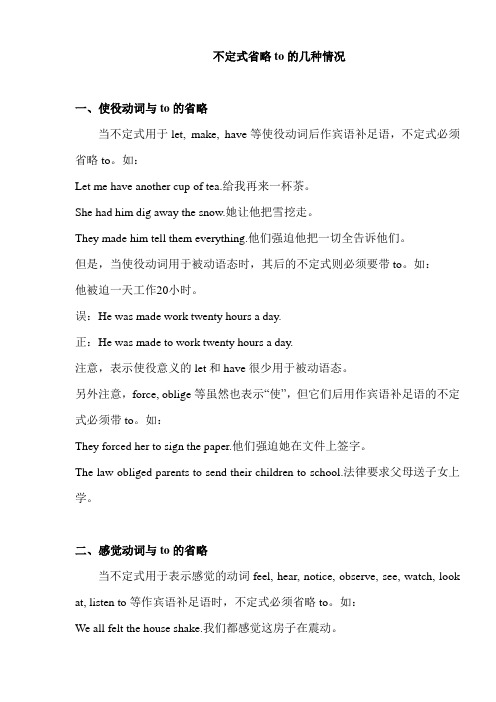动词不定式符号to后动词的省略解析
比较省略to的动词不定式与完整形式的用法差异

比较省略to的动词不定式与完整形式的用法差异不定式是英语中的一种动词形式,由to+动词原形构成。
然而,在某些情况下,我们可以省略to,只使用动词原形。
本文将比较省略to的动词不定式和完整形式的用法差异。
1.动词后的宾语省略to的动词不定式通常用于及物动词后直接跟宾语的情况。
例如:I want [to go] to the beach.(我想去海滩。
)I want [you to go] to the beach.(我想让你去海滩。
)在这些句子中,动词want后面的不定式可以省略to。
这种省略形式更为简洁,但不影响句子的意思。
2.情态动词后的动词不定式情态动词后的动词不定式可以省略to。
情态动词包括can、could、may、might、will、would、shall、should等。
例如:I can [speak] English.(我会说英语。
)He should [study] harder.(他应该更加努力研究。
)在这些句子中,情态动词后面的动词不定式可以省略to。
3.让步状语从句在让步状语从句中,省略to的动词不定式也常见。
例如:She worked hard [to pass] the exam。
although she was sick.(尽管她生病了,但是她努力工作以通过考试。
)可以省略to的动词不定式用于表达让步的情况,使句子更为简洁明了。
4.情感动词及感官动词后的动词不定式感觉、听觉和看法等动词后的动词不定式也可以省略to。
例如:I saw him [run] in the park.(我看见他在公园里跑。
)She heard the baby [cry].(她听到宝宝哭泣。
)在这些句子中,感觉动词saw和heard后的动词不定式可以省略to。
综上所述,省略to的动词不定式在某些情况下能够使句子更加简洁,但在其他情况下仍需要使用完整形式。
正确地理解和使用这种用法可以提高语言表达的准确性和流利度。
归纳省略to的动词不定式用法

归纳省略to的动词不定式用法归纳省略"to"的动词不定式用法动词不定式是英语中的一个重要语法结构,它由动词原形加上不定式标志"to"构成。
然而,在某些情况下,我们可以省略动词不定式中的"to"。
本文将总结归纳省略"to"的动词不定式用法。
1. 动词感官(verbs of perception)有些动词表示感官知觉,当它们后面接动词不定式时,可以省略"to"。
这些动词包括:- see(看见)- hear(听见)- watch(观看)- feel(感觉)- notice(注意到)- observe(观察)- perceive(察觉)- etc.示例:- I saw him leave the room.(我看见他离开了房间。
)- She heard the birds sing.(她听见了鸟儿的歌声。
)2. 动词让步(verbs of permission)某些动词表示允许、让步,当它们后面接动词不定式时,可以省略"to"。
这些动词包括:- let(允许)- make(使)- have(让)- help(帮助)- watch(观看)- etc.示例:- They let me go to the party.(他们让我去参加派对。
)- She made him clean his room.(她让他打扫了房间。
)3. 动词感觉(verbs of sensation)有些动词表示感觉,当它们后面接动词不定式时,可以省略"to"。
这些动词包括:- feel(感觉)- hear(听到)- listen(听)- watch(看)- smell(闻)- etc.示例:- I heard her sing beautifully.(我听到她唱得很美。
)- He watched the sunset in awe.(他惊叹地看着日落。
不定式符号to的省略

不定式符号to的省略不定式符号to的省略1.不定式作宾补省to:在英语中有的动词用不定式做宾补时需要省略不定式符号to。
可以这样进行记忆如下动词:二感觉:feel;perceive二听:hear; listen to;三让:have ; let ; make [have or let及少用被动] 五看:see; watch; notice; observe; look at。
共12个。
Whenever something is wrong with you, please do let me know.I will have the students write a passage about Internet.On seeing the young child fall into the lake, John sprang to his feet, and went to the rescue.Who are you going to have type this letter for you?Who would you rather have clean the room?It seemed so long before he heard the stone hit the water.Modesty helps one make progress while conceit makes one lag behind. 谦虚使人进步,骄傲使人落后。
He did not perceive anyone come in.他没有觉察到有人进来。
如果上述动词用被动语态时,不定式符号to不能省略。
Paul doesn't have to be made to learn. He always works hard.The fat boy was made to take more exercise to lose weight.He was angry to be made to pay double the price for it.The thief was perceived to steal into the house.有人看见小偷溜进那房子里去了。
探讨省略to的动词不定式的语法规则

探讨省略to的动词不定式的语法规则
动词不定式是英语中的一种常见语法结构,而to是将动词不定式和动作的执行者隔开的符号。
但是,在某些情况下可以省略to,那么何时可以省略,何时不可以省略呢?
可以省略to的情况
1.当动词不定式作为宾语时,to可以省略。
例如:I want (to) watch a movie tonight.(我今晚想看电影。
)
2.介词后面所跟的动词不定式中的to可以省略。
例如:He refused to talk to me. / He refused talking to me.(他拒绝和我谈话。
)
3.特定动词后面的动词不定式中的to可以省略。
例如:let me know / let me to know(让我知道)
不可以省略to的情况
1.当动词不定式作为主语或表语时,to不可省略。
例如:To be or not to be, that is the question.(生存还是毁灭,这是一个问题。
)
2.在被动语态中,to不可省略。
例如:The building is going to be demolished.(这座建筑将要被拆除。
)
3.在复合宾语结构中,to不可省略。
例如:I want you to help me.(我想让你帮我。
)
综上所述,省略to的动词不定式在特定情况下是可以的,但是也需要视情况而定,不能一味地省略。
掌握好省略to的动词不定式的语法规则,可以有效提高英语的表达水平。
比较省略to的动词不定式与完整形式的用法差异

比较省略to的动词不定式与完整形式的用法差异动词不定式是使用动词的基本形式(即原形动词)作为动词的名词或形容词补语。
在使用动词不定式时,常常加上“to”作为其标志。
但是在有些情况下,可以省略这个“to”,只保留动词的原形形式。
以下是比较省略to的动词不定式与完整形式的用法差异:1. 宾语是动词不定式时- 完整形式:We decided to go to the beach.- 省略to形式:We decided to go to the beach.在这种情况下,完整形式和省略to形式没有什么差异。
两者都是正确的用法。
2. 动词不定式作状语时- 完整形式:To pass the exam, he studied all night.- 省略to形式:He studied all night to pass the exam.在这种情况下,完整形式和省略to形式的语序是不同的,但意思是相同的。
3. 特定动词后的动词不定式有些动词后必须使用完整形式的动词不定式,而不是省略to形式的动词不定式。
以下是一些必须使用完整形式的动词:- agree:I agreed to go to the party.- choose:She chose to stay home.- offer:He offered to help me.4. 表示目的动词后的动词不定式在表示目的的动词后,必须使用完整形式的动词不定式。
以下是一些表示目的的动词:- hope:I hope to see you soon.- plan:We plan to visit the museum.- want:She wants to learn Spanish.总的来说,省略to的动词不定式常常用于口语和非正式写作中。
但在某些情况下,必须使用完整形式的动词不定式,这需要根据语境来判断。
不定式省略to的10种情况

不定式省略to的几种情况一、使役动词与to的省略当不定式用于let, make, have等使役动词后作宾语补足语,不定式必须省略to。
如:Let me have another cup of tea.给我再来一杯茶。
She had him dig away the snow.她让他把雪挖走。
They made him tell them everything.他们强迫他把一切全告诉他们。
但是,当使役动词用于被动语态时,其后的不定式则必须要带to。
如:他被迫一天工作20小时。
误:He was made work twenty hours a day.正:He was made to work twenty hours a day.注意,表示使役意义的let和have很少用于被动语态。
另外注意,force, oblige等虽然也表示“使”,但它们后用作宾语补足语的不定式必须带to。
如:They forced her to sign the paper.他们强迫她在文件上签字。
The law obliged parents to send their children to school.法律要求父母送子女上学。
二、感觉动词与to的省略当不定式用于表示感觉的动词feel, hear, notice, observe, see, watch, look at, listen to等作宾语补足语时,不定式必须省略to。
如:We all felt the house shake.我们都感觉这房子在震动。
I heard him go down the stairs.我听见他下楼了。
Did you notice her leave the house?她离开屋子你注意到了吗?I watched her get into the car.我看着她上了车。
但是,当feel后用作宾语补足语的不定式为to be时,则不能省略to。
省略to的不定式了解省略to的不定式的用法
省略to的不定式了解省略to的不定式的用法不定式是英语中的一种非谓语动词形式,它通常由动词原形加上to 构成,例如:to go(去), to eat(吃),to sleep(睡觉)等。
然而,在某些情况下,我们可以忽略不定式前的to,这种形式被称为省略to的不定式。
本文将介绍省略to的不定式的用法以及相关注意事项。
一、省略to的不定式主要用于下列几种情况:1. 动词let当动词let后面接不定式时,to可以省略。
例如:- She let me go to the party.(她让我去参加派对。
)2. 感官动词感官动词如see、watch、hear等后面接宾语和不定式时,to可以省略。
例如:- I heard him sing in the concert.(我听到他在音乐会上唱歌。
)3. 情态动词情态动词如can、may、must等后面接不定式时,to可以省略。
例如:- You must do your homework before playing games.(你必须先做作业再玩游戏。
)4. 动词help当动词help后面接不定式时,to可以省略。
例如:- He helped me carry the heavy boxes.(他帮我搬运沉重的箱子。
)二、需要注意的细节问题:1. 第一个动词是make、let、help、see、hear、watch或feel时,后面的动词不定式可以省略to;2. 在句子中,第一个动词是感官动词或情态动词时,后面的动词不定式可以省略to;3. 省略to的不定式只适用于动词不定式的主动形式,不能用于被动形式;4. 不定式的完整形式“to + 动词原形”通常更正式,所以在正式场合或文学作品中,建议使用完整形式。
三、案例分析:1. They helped me (to) clean the house before the guests arrived.(他们帮我在客人到来之前打扫了房间。
动词不定式省略to的9种情况
不定式省略to的九种情况一、使役动词后省略to的情况在let,make,have等使役动词后用作宾语补足语的不定式必须省略to。
如:Mymotherwouldn’tletmegotothefilm.我妈妈不会让我去看电影的。
Idon’tlikemilk,butmothermademedrinkit.我不喜欢牛奶,可是母亲强迫我喝。
Iwouldhavehimwaitformeatthegateofthepark.我要他在公园门口等我。
注意:1.当使役动词用于被动语态时,要补上在主动语态中省略的to(主要是指make,let和have很少用于被动语态)。
2.force,oblige等虽然也表示2.force,oblige“使”,但它们后用作宾语补足语的不定式必须带to。
如:Heforcedmetogowiththem.他迫使我同他们一起去。
Thepolice obligedhimtoleave.警方强迫他离开。
二、感觉动词后省略to的情况在感觉动词后用作宾语补足语的不定式必须省略to。
如:Iwatchedhergetinto thecar.我看着她上了车。
Isawthewomanenterabank.我看见这个女人进了一家银行。
Weoftenhearhersingthissong.我们经常听到她唱这首歌。
Didyounoticeherleavethehouse?她离开屋子你注意到了吗?注意:1.这里所说的感觉动词主要包括see,hear,observe,notice,feel,watch等。
但是它们用于被动语态时,其后的不定式必须带to。
如:Thewomanwasseen toenterabank.有人看见这个女人进了一家银行。
但是,用于以上句型的动词notice和watch和通常不用于被动语态。
2.类似地,动词lookat和listento 后用作宾语补足语的不定式也不带to。
如:Welistenedtotheoldmantellhissto r y .我们听这位老人讲述3.若动词feel 后用作宾语补足语的不定 式为t o b e ,t o (其他情to)。
英语中不定式省略to的10种情况
英语中不定式省略to的10种情况一、使役动词与to的省略当不定式用于let, make, have等使役动词后作宾语补足语,不定式必须省略to。
如:Let me have another cup of tea. 给我再来一杯茶。
She had him dig away the snow. 她让他把雪挖走。
They made him tell them everything. 他们强迫他把一切全告诉他们。
但是,当使役动词用于被动语态时,其后的不定式则必须要带to。
如:他被迫一天工作20小时。
误:He was made work twenty hours a day.正:He was made to work twenty hours a day.注意,表示使役意义的let和have很少用于被动语态。
另外注意,force, oblige等虽然也表示“使”,但它们后用作宾语补足语的不定式必须带to。
如:They forced her to sign the paper. 他们强迫她在文件上签字。
The law obliged parents to send their children to school. 法律要求父母送子女上学。
二、感觉动词与to的省略当不定式用于表示感觉的动词feel, hear, notice, observe, see, watch, look at, listen to等作宾语补足语时,不定式必须省略to。
如:We all felt the house shake. 我们都感觉这房子在震动。
I heard him go down the stairs. 我听见他下楼了。
Did you notice her leave the house? 她离开屋子你注意到了吗?I watched her get into the car. 我看着她上了车。
但是,当feel后用作宾语补足语的不定式为to be时,则不能省略to。
动词不定式省略的几种情况
动词不定式省略的⼏种情况动词不定式的基本形式是“to + 动词原形”。
但有些词后⾯的“to”有时会省略。
归纳起来,常有下列⼏种情况:1. 作使役动词(如make,let,have)和感官动词(如look at,see,hear,watch,listen to,notice)等的宾语补⾜语时。
如:They made the children work 12 hours a day. 他们强迫孩⼦们⼀天⼲12⼩时。
Let me go. 让我去吧。
I saw him come. 我看见他来了。
We often hear her sing an English song in the classroom. 我们经常听见她在教室唱英语歌。
值得注意的是:以上句⼦若变为被动语态时,“to”则不能省略。
2. 在动词help后的动词不定式可带“to”,也可不带“to”。
如:Will you help me (to) plant this tree,please?请你帮我种这棵树,好吗?3. 两个或两个以上不定式连⽤,其作⽤相同时,除第⼀个不定式带“to”外,其余不带“to”。
如:It’s better to give than receive. 给予⽐索取好。
4. 在Why not后。
如:Why not have some milk? 为什么不来些⽜奶呢?5. had better /best,would rather等固定结构中。
如:I would rather stay here. 我宁可留在这⼉。
6. 在but,except,besides介词前⾯有⼀定义动词“do”时,介词后的不定式可以省略“to”。
如:We can do nothing but wait. 除了等我们别⽆他法。
7. 在助动词和情态动词后接动词原形,动词也是不带“to”的动词不定式的⼀种形式。
如:We can’t play basketball until we finish our homework. 直到完成作业后我们才能去打篮球。
- 1、下载文档前请自行甄别文档内容的完整性,平台不提供额外的编辑、内容补充、找答案等附加服务。
- 2、"仅部分预览"的文档,不可在线预览部分如存在完整性等问题,可反馈申请退款(可完整预览的文档不适用该条件!)。
- 3、如文档侵犯您的权益,请联系客服反馈,我们会尽快为您处理(人工客服工作时间:9:00-18:30)。
动词不定式符号to后动词的省略, 如:like to, love to, want to, hope to, try to, expect to, intend to, be afraid to, prefer to, need to等.
1. --- Would you like to have dinner with me?
it可以指人或物, 是特指,与所指名词是同一人或事物: 1. I bought a bike yesterday. _____________(很便宜).
2. My mother gave me some money last Sunday. I’ll_________________________(买书).
one可指人或物(可数名词单数),是所指 名词同类中的一个.当 被the, this ,that 所修饰时,则表示特指.
1. --- Do you have a car? --- Yes, I have ______ and I have ____________.(一辆红色的)
2. --- What about this yellow T-shirt? --- Pleas)
• I lost a pen yesterday and I couldn’t find it anywhere.
• I hate ____ when people talk with mouths full.
a. it b. that c. those d. them
one, that 和 it 的替代用法 (ones, those, they/them)
Part one: 1.Anything you want? = Is there anything you want? 2.Glad to see you. = I’m glad to see you. 3.Taken into a warm room, a piece of ice will turn
into water. =If a piece of ice is taken into a warm room, it
will turn into water. 4.The more practice, the better.
=The more practice there is, the better it will be.
2. The water in this river is cleaner than ______________________.(海里的)
3. The population of China is larger than __________________________.(世界上所有国家的)
• Kate showed the painting to all her classmates except ___ who had already seen it.
a. ones b. the ones c. some d. them
• Those who are free this afternoon will attend the meeting.
---Yes, __________________________.
2. --- Did you get a ticket? --- No, ______________(我试过), but there wasn’t any left.
3. --- Will you stay for lunch? --- _____________________.(我希望如此.)
Part two: 1.--Did you get a ticket?
--No, I tried to (get a ticket). 2.--Has he finished his homework?
--I hope so. (I hope he has finished his homework.) 3.—Will he return at the weekend? --I’m afraid not. (I’m afraid he will not return at the weekend.) 4.He speaks English more fluently than you do. = He speaks English more fluently than you speak English.
但是如省略内容中有be动词或助动词have时,be或have要保留.
1. --- Are you a college student? --- No, but ______________.
2. --- He ought to have told me earlier. --- Yes, he ___________.
Part three
• The girl is not the one I saw knocked off the bike this morning.
• --Have you still kept your watch?
--No, I have sold one.
• Few pleasure can equal that of a cool drink on a hot day.
3. Someone is knocking at the door. ___________________________?(会是谁呢?)
Exercises:
3. This book is _____________________________(他们需 要的).
that作替代词时只指物(或事),是特指,等于 “ the+被替代的名 词”,此时 that后要带后置定语.
1. My room is next to _________________________(我父 亲的).
